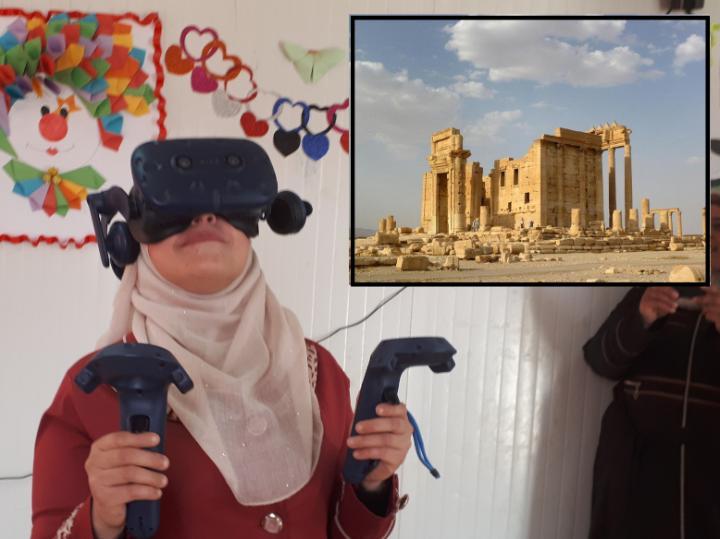Virtual reality brings Syria home to refugee communities
Virtual reality (VR) technology is being harnessed by researchers at the University of Bradford in an international collaboration to help Syrian refugees in Jordan reconnect with their homeland.
Teaming up with global humanitarian organisation, Mercy Corps, archaeology and peace studies researchers at the University of Bradford are working with refugee communities to use digital heritage tools to promote well-being and social cohesion among displaced communities.
Called BReaTHe – Building Resilience Through Heritage – the project draws on 3D models and public engagement methodologies developed through multiple past research projects. The models are used along with immersive photography and video to create virtual reality experiences of heritage locations and collections.

Project lead, Dr Adrian Evans, from the School of Archaeological and Forensic Sciences, explained: “Syrian heritage and culture has been under threat because of the conflict in the region and the impact of displacement puts a considerable toll on those individuals and communities that are affected. At Bradford we’ve been working to digitally capture and recreate some of that heritage using VR. Through the BReaTHe project we are channelling those resources to bring these places back to life for Syrian refugee communities as a way to improve the mental health of individuals and the communities.”
With funding from the Global Challenges Research Fund, through the Arts and Humanities Research Council, and Research England, the team has been working with Mercy Corps to deliver the project in the Azraq Refugee Camp in Jordan. Participants use VR headsets to visit locations in Syria from both their home and distant regions. The project works alongside Mercy Corps’ psychosocial support programme, ensuring that participants can work through the emotions triggered by the VR experience in a safe and productive way.
The refugees have been able to virtually ‘visit’ multiple locations that have since destroyed by Islamic State and the war in Syria. These include Aleppo Souk, claimed to be one of the oldest shopping centres in the world, and the Temple of Bel in Palmyra. They have also been able to visit a virtual museum as a result of the University’s partnership with the Jordan Museum.
Co-researcher, Dr Karina Croucher, from the School of Archaeological and Forensic Sciences, said: “We can use this technology to really bring Syria home to the people who were forced to leave. With the headset on, you feel as if you’re actually walking around inside a real place. One of the refugees told us, ‘We aren’t able to see Syria with our own eyes, but through VR, you brought Syria to us.’ That feels like an important and powerful thing to be able to offer.”
She added: “This pilot project has enabled us to show the refugees what this technology is capable of and to get ideas from them about what places they would like to explore in the future. So, alongside historic sites, they’ve told us they’d like to go to everyday environments, such as an ordinary market place, or a typical Syrian house.”
Professor Owen Greene, from the School of Peace Studies and International Development, said: “This programme also builds on extensive previous work with displaced or divided communities in conflict affected areas, to help build confidence and resilience within communities against insecurity and division. This innovative multidisciplinary approach focussed on developing mutual awareness of heritage and stimulating dialogues through the use of VR and cultural exchanges has had very positive responses. It is proving to be productive and potentially valuable for many contexts.”
Dr Evans added: “What we’re finding is the VR is a really great ‘hook’ to create discussion and activities around shared heritage. We’ve just had an event where participants used the VR alongside taking part in dancing, storytelling, and local cuisine sharing. It is allowing the communities to open up and share the heritage they are proud of.”
The team is now consulting with stakeholders in refugee camp governance, UNHCR, on the impact and potential quality of life changes this type of work can create.


